Key takeaways:
- Band rivalries deeply connect with personal identity, fostering feelings of belonging and community among fans.
- These rivalries enhance social interactions, creating lively discussions and reinforcing friendships through shared passions.
- Historical rivalries in music, such as The Beatles vs. The Rolling Stones, illustrate cultural narratives and societal changes over time.
- Embracing diverse musical choices enriches personal perspectives, allowing deeper connections with different genres and the stories they tell.

Understanding band rivalries
Band rivalries are fascinating spectacles, often fueled by the passionate loyalty fans feel for their favorite artists. I remember my high school days, sitting in the cafeteria, where debates erupted over which band reigned supreme. Did you ever find yourself caught in a similar conversation, feeling your heart swell with pride for your chosen side?
Through my experience, I’ve seen how these rivalries don’t just stem from music; they tap into identity and belonging. When my friends and I fought over which band had the best lyrics or the most compelling live performances, it felt like more than just a musical dispute—it was about expressing who we were. Isn’t it interesting how a simple note or lyric can ignite fierce passion and belonging?
These rivalries also reveal a deeper cultural commentary. They mirror societal divisions, reflect trends, and sometimes even challenge norms. I often wondered, is it the music we love, or is it the community surrounding it that keeps us so invested? In my case, the debates and the passion connected me to a larger narrative, making every concert and album release feel like a significant event in my life.
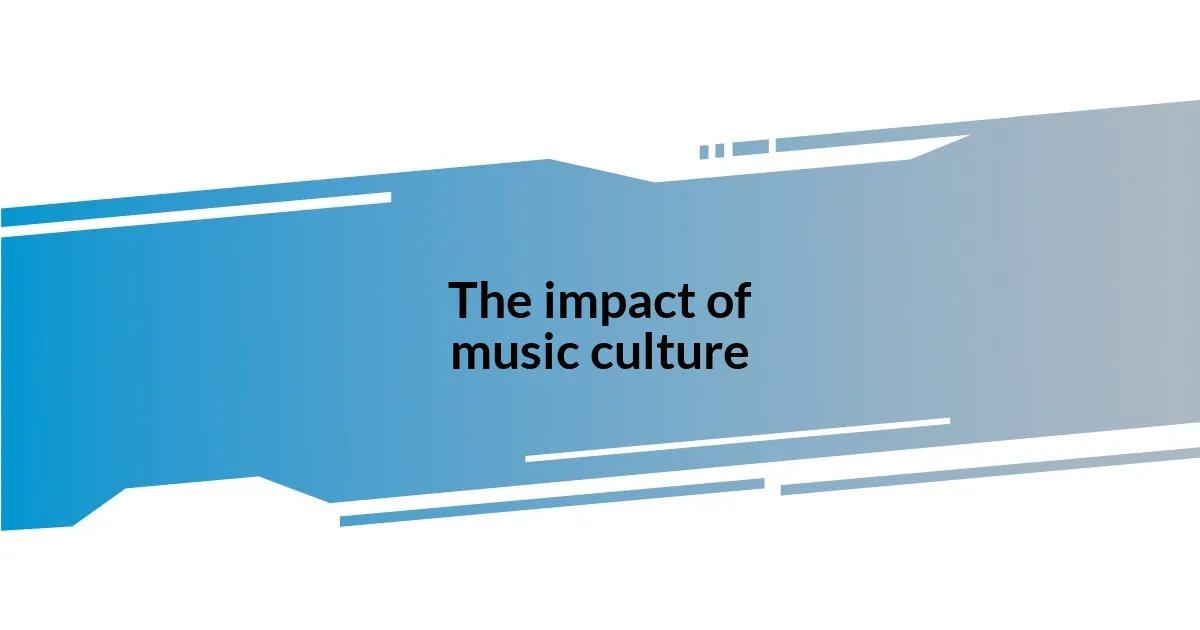
The impact of music culture
Music culture has a profound impact on how we perceive ourselves and relate to others. I can still recall a summer night, sitting around a bonfire with friends, where the discussion shifted from favorite songs to which band represented the ‘true essence’ of rock. This setting illustrated how deeply intertwined our musical preferences were with our identities, creating bonds that transcended mere fandom.
Moreover, these rivalries often influence our social interactions and community dynamics. When I attended a music festival, I felt the tension in the air as fans from rival bands engaged in playful jabs and debates. This energetic atmosphere turned friends into rivals, and those rivalries became the highlight of shared moments, sparking laughter and camaraderie. It made me realize that while the music itself is vital, it’s the layers of culture and rivalry that enrich our experiences.
Lastly, music culture shapes broader societal narratives, making us reflect on our values and beliefs. I remember feeling a wave of nostalgia during a debate on the meaning behind lyrics from opposing bands. It was more than just competition; it opened avenues for deep discussions about life’s struggles, love, and resilience. Such conversations, born out of rivalry, helped me understand my own views better, showcasing how music can be a mirror reflecting our inner lives.
| Aspect | Impact of Music Culture |
|---|---|
| Identity | Influences self-perception and belonging |
| Social Interactions | Creates rivalries that enhance social bonds |
| Societal Narratives | Challenges and reflects broader values and beliefs |
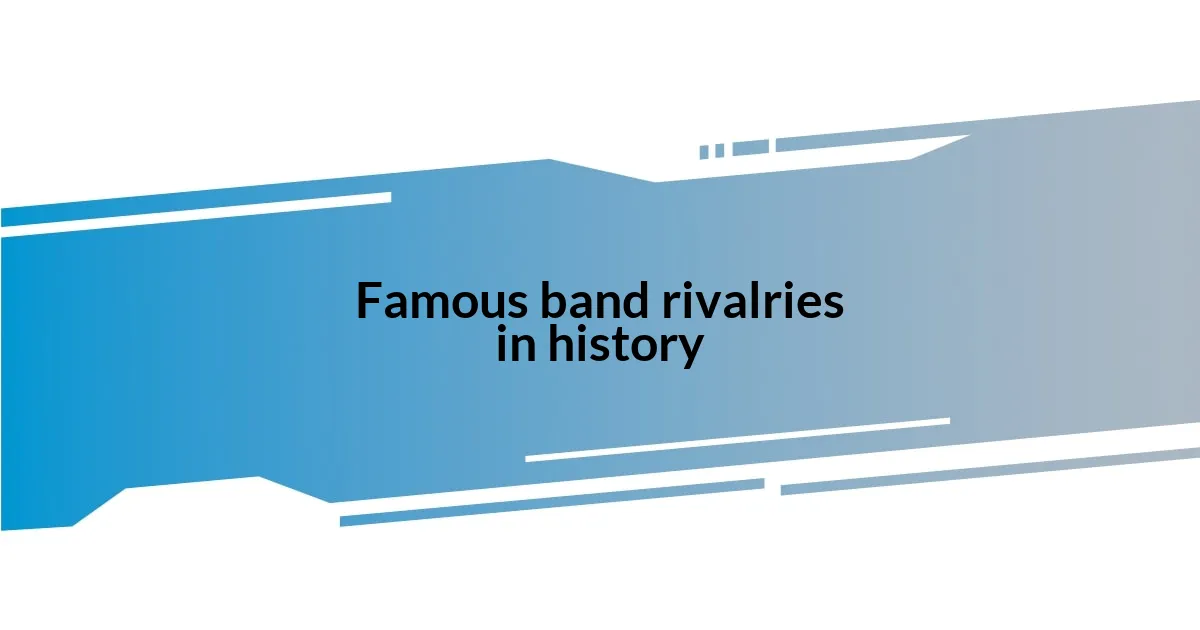
Famous band rivalries in history
Some of the most memorable band rivalries have formed a cornerstone of music history, forever altering fan dynamics and even shaping entire genres. For instance, the infamous clash between The Beatles and The Rolling Stones in the 1960s wasn’t just about musical styles; it encapsulated the cultural and social revolutions of the era. I remember flipping through old magazines and feeling the pulse of rivalry that stirred my passion for music. The tension seemed to echo not only in their songs but in the conversations buzzing around me.
Here are a few notable rivalries that left a significant mark:
-
The Beatles vs. The Rolling Stones: Often viewed as the epitome of British rock rivalry, each band attracted fans by embodying contrasting lifestyles—The Beatles’ experimentation versus The Stones’ rebellious edge.
-
Nirvana vs. Pearl Jam: This rivalry represented the Seattle grunge scene’s internal conflicts, bringing to light the tension between artistic integrity and commercial success. I still recall the heated debates among my friends, passionately defending their favorites.
-
Oasis vs. Blur: Their battle in the ’90s for Britpop supremacy captured the imaginations of fans worldwide, culminating in an unforgettable moment when their songs dominated the charts. I remember the carefree afternoons spent dissecting their lyrics, feeling like I was part of something bigger.
-
Tupac Shakur vs. The Notorious B.I.G.: A rivalry that transcended music, deeply entwined with issues of race and violence in America, ultimately reflecting on a cultural crisis that was hard to ignore. Hearing those narratives unfold was like witnessing the power of storytelling at its finest.
Each of these rivalries has a rich narrative that resonates with what fans were feeling at the time, and I often found myself reflecting on how my own preferences mirrored these intense musings.
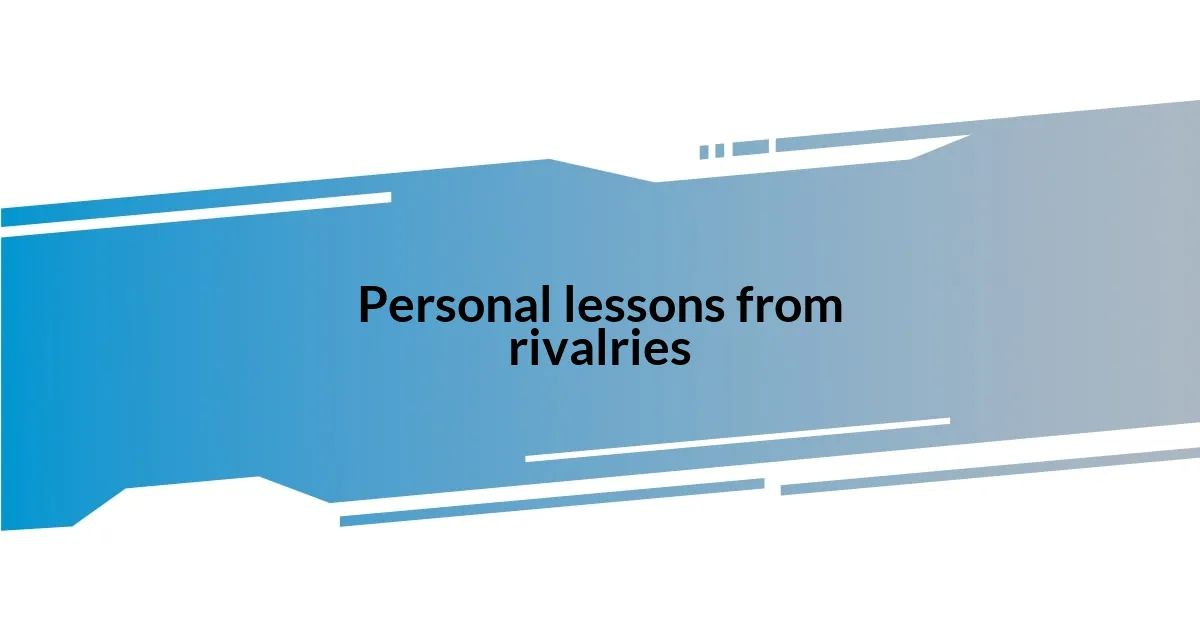
Personal lessons from rivalries
Rivalries have taught me that passion can ignite our deeper emotions and beliefs. I vividly recall days spent debating the merits of one band over another with friends, where a simple discussion turned into a lively exchange filled with laughter and occasional heated arguments. Those moments made me realize how our preferences reflect not just musical taste, but also our values and personalities.
One lesson I gleaned revolves around respect within rivalry. I remember an intense discussion about my admiration for Oasis, while my best friend stood firmly by Blur. What struck me was how we could fiercely defend our favorites yet still treasure the friendship we shared. It made me ponder—can rivalry truly enhance our relationships? In my experience, it certainly can, fostering deeper connections through shared passions, while allowing us to appreciate different perspectives.
Another insight I’ve drawn from these rivalries is the importance of perspective. Listening to opposing viewpoints has often led me to rethink my own opinions about music and life. I find joy in exploring why someone resonates with a certain band or song, and it pushes me to dig deeper into what I value myself. It almost feels like each rivalry has shaped parts of my identity, making me question, “What does this band really mean to me?” The answers often surprise me and broaden my understanding of the music I love.
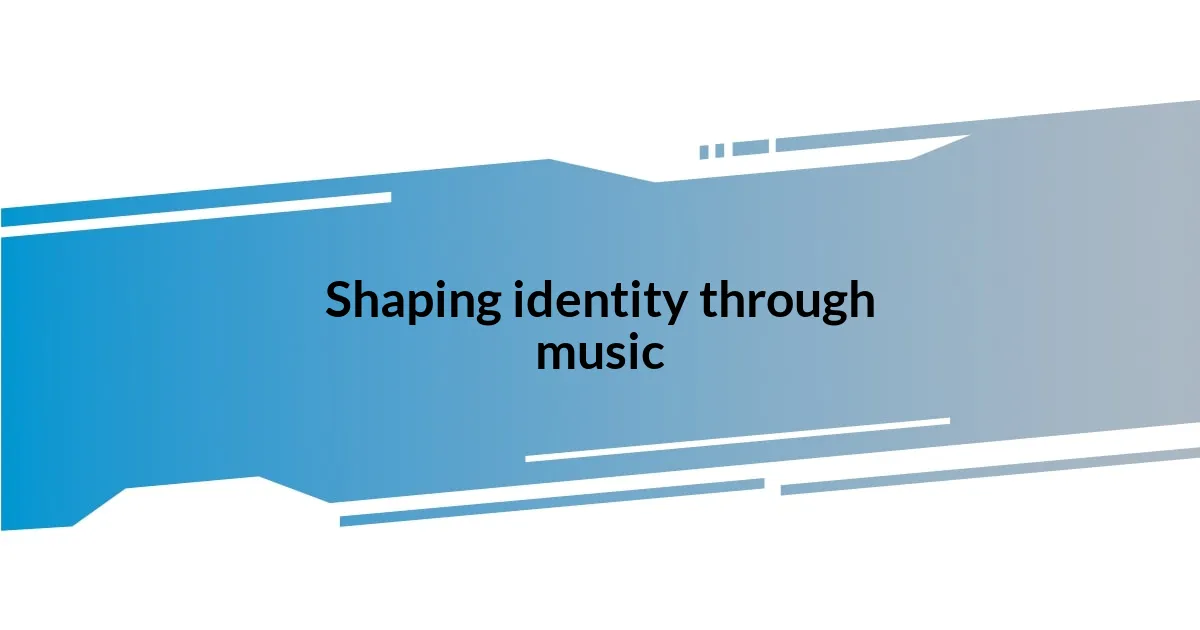
Shaping identity through music
Music has a remarkable ability to shape our identities, acting as a lens through which we interpret the world around us. I still vividly remember those high school days when my friends would wear their band shirts like badges of honor. Each shirt told a story, echoing not just musical preferences but aspirations, beliefs, and lifestyle choices. It became clear to me that what we listened to was not just about the sound; it was about who we were.
Reflecting on the passionate arguments I had about which artist truly represented the spirit of a generation, I realized that these discussions were often more than just music critiques. They were a way for us to carve out our identities against a backdrop of cultural narratives. I remember attending a concert where fans were split between two performing artists; the energy in the crowd was electric. It was like being part of a living tapestry of emotions and identities all woven together through the threads of our favorite songs.
As I continue to explore my musical journey, I can’t help but ask myself: how do the rivalries within fandoms influence my views and relationships? I’ve come to understand that each musical choice reflects my evolving self. Delving into why I gravitate towards certain bands or genres often sparks a deeper exploration of my values. It makes me wonder, does the music I love define who I am, or does it simply reflect who I’ve become? I truly believe that these discoveries enrich my identity, guiding me to appreciate the vibrant spectrum of perspectives found within the world of music.
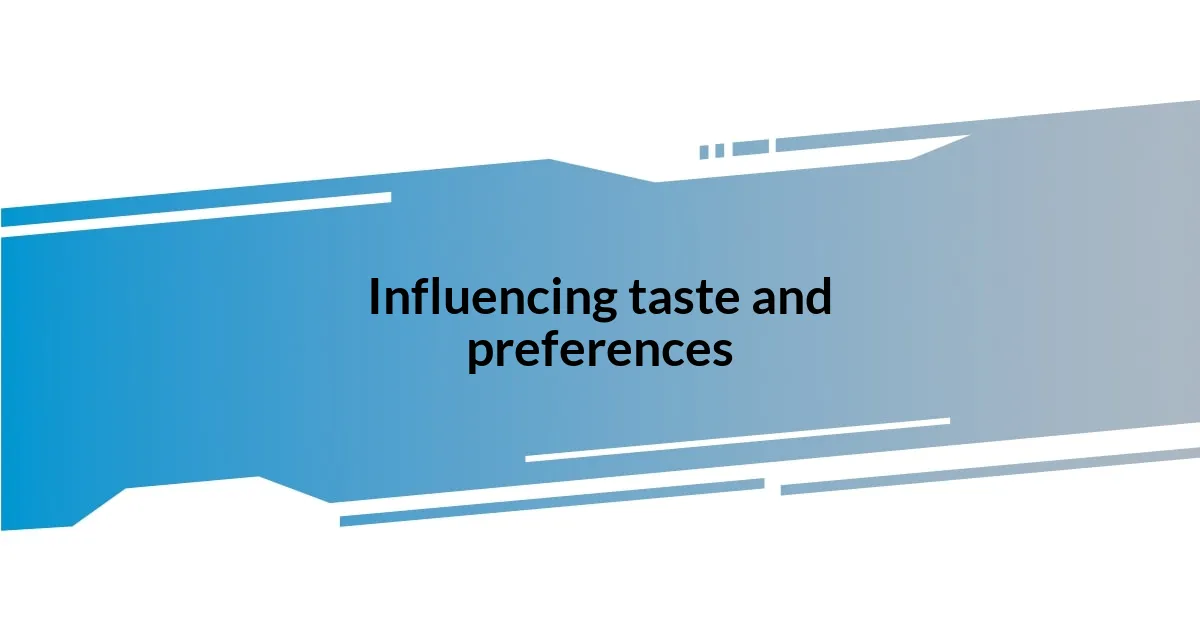
Influencing taste and preferences
In navigating the world of band rivalries, I’ve often found my tastes evolving. For instance, I used to be firmly planted on Team Radiohead, passionately defending their artful sound, while friends rallied behind Coldplay. Those spirited debates not only fueled my appreciation for Radiohead but also nudged me to explore Coldplay’s catalog. I often wonder, does the need to justify my taste sometimes narrow my worldview? It’s like recognizing that there’s more than one way to express creativity.
Moreover, those friendly competitions taught me how personal connection can influence our preferences. I recall a particular road trip where my friends and I had a sing-along battle, pitting our favorite tracks against each other. Each song choice reflected more than just a preference; it echoed memories, emotions, and experiences we shared. This made me realize that my music tastes are tied to the people I listen with, creating a community around shared musical moments. How can we separate our love for music from the bonds it fosters?
As I look back, these rivalries also provoked a deeper self-reflection. I distinctly remember a moment of realization while listening to a legendary live performance—my friends were headbanging to one song, while I felt an overwhelming connection to another ballad. It struck me how music transcends mere sound; it resonates differently with each of us. This makes me ask: how many times have our musical inclinations led us to reinforce our identities? I believe each rivalry not only helps shape our preferences but also broadens our understanding of ourselves and each other.
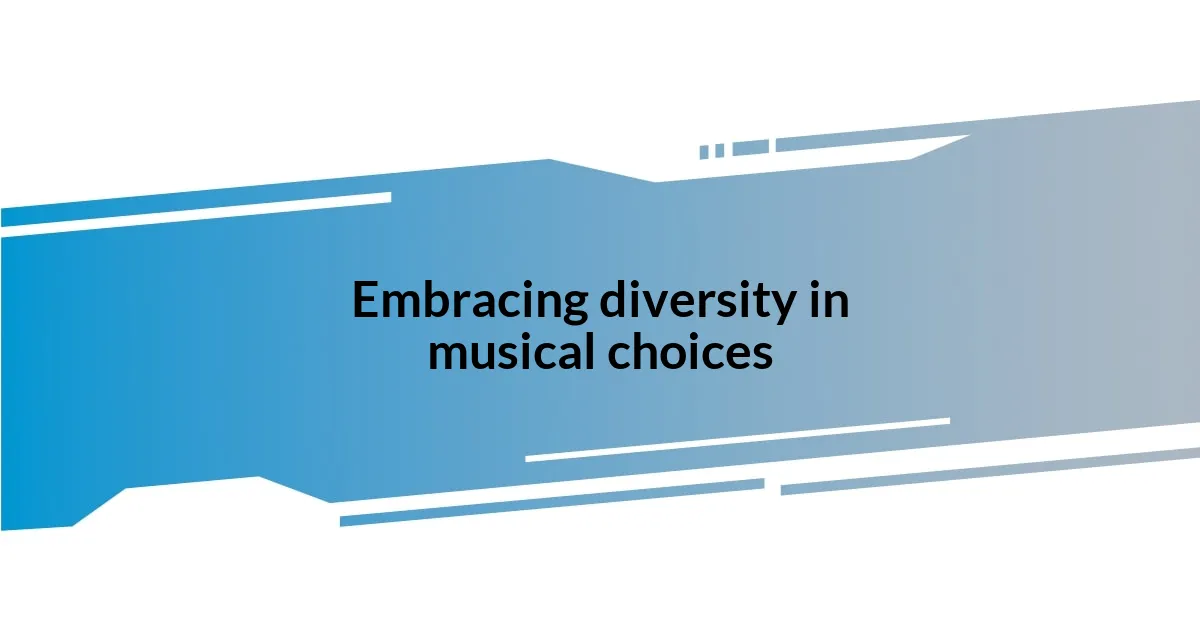
Embracing diversity in musical choices
Diversity in musical choices has become a cornerstone of my listening experience. I recall a time during college when I found myself jamming out to everything from punk rock to classical symphonies. I never anticipated how much power that eclectic mix would have on my perspective. Suddenly, the lines between genres blurred, and I couldn’t help but wonder: how did I ever limit myself to one style? That realization opened my ears to different rhythms and lyrics, allowing me to appreciate the artistry in every note.
One of the most memorable moments happened at a friend’s wedding. A traditional band played folk tunes while the DJ mixed in hip-hop classics. The sheer joy on the dance floor, where everyone from grandparents to younger cousins danced together, struck me. This blend of sounds created a beautiful harmony, showcasing the richness that comes from embracing varied musical choices. I found myself thinking, don’t we all have a little bit of every genre in us? Each beat and lyric added nuance to the celebration, mirroring our diverse backgrounds and shared joy.
As I dive deeper into different musical styles, I’ve come to appreciate how each genre tells its own story. I often find myself contemplating the meaning behind the lyrics of a country ballad compared to the raw energy of a rap track. It prompts me to ask: what life experiences do these artists convey through their music, and how does that resonate with my own journey? This exploration of diversity not only enriches my playlist; it also broadens my understanding of the human experience. I have no doubt that embracing different musical choices has profoundly shaped how I connect with others and view the world.